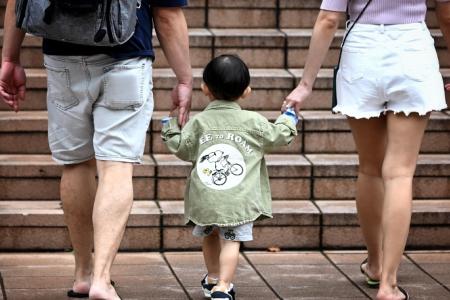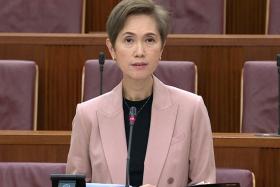Start date of revised parental leave will not be expedited
The Government will not bring forward the implementation date of the new shared parental leave scheme, which starts on April 1, 2025.
The 2025 date aims to strike a balance between giving employers enough time to make the necessary changes in a “tight labour market” and allowing parents to benefit from the scheme as soon as possible, said Minister in the Prime Minister’s Office Indranee Rajah on Sept 10.
She was responding to questions by Ms Hany Soh (Marsiling-Yew Tee GRC) and Mr Desmond Choo (Tampines GRC) about the new scheme. Ms Soh had asked why the scheme is starting on April 1, 2025, and if the Government could consider bringing forward the implementation date.
During the National Day Rally in August, Prime Minister Lawrence Wong announced that parents will get another 10 weeks of shared parental leave, on top of their current leave entitlements.
The two extra weeks of voluntary paternity leave will also be made mandatory from April 1, 2025. This brings paternity leave to a total of four weeks.
The new changes bring the total amount of government-paid parental leave to 30 weeks, as mothers currently get 16 weeks of maternity leave.
To give employers time to adjust, changes to the shared parental leave scheme will be made in two phases, starting with six weeks of shared leave from April 1, 2025, then the full 10 weeks from April 1, 2026.
Ms Indranee explained that the implementation date was set after extensive consultations with the tripartite partners.
She said the Government had considered implementing the new scheme earlier so more parents could benefit, but employers had asked for a longer lead time to prepare for the change. This includes updating administrative processes and putting in place measures to manage employees’ extended absences.
She added that this is especially so since the new shared leave scheme requires coordination between both parents and their respective employers.
The Government also needs time to bring about various legislative and operational changes, she said.
Ms Indranee said the Government will organise webinars for employers to understand the operational details of the new scheme, and give more information on existing grants and resources they can tap to strengthen their manpower-planning capabilities.
She said: “Our research has shown that utilisation of parental leave is often dependent on workplace support. We will work with tripartite partners to shape workplace norms and culture, including to establish the norm of fathers taking leave to care for and bond with their infants.”
Mr Choo asked Ms Indranee how the Government can guide employers to better support staff – especially older workers – who have to bear an additional workload to cover the duties of those on parental leave.
Ms Indranee pointed out that the Government is paying for the shared parental leave, which means the companies can save on salaries for staff on such leave. With the money saved, they can hire other workers to take on the duties of the staff on leave.
Tapping automation to lighten workloads and productivity solution grants is another option, she said.
Another solution, she said, is to pay extra to staff who are covering their colleague’s workload during their absence.
Get The New Paper on your phone with the free TNP app. Download from the Apple App Store or Google Play Store now


